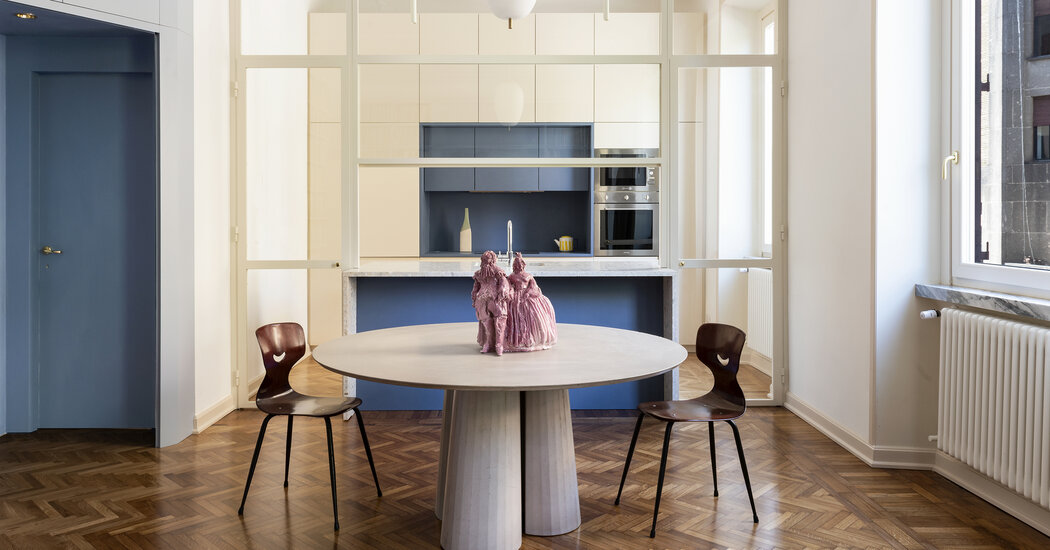
Maurizio Cascella loved his rental apartment in Rome so much that he stayed there for nearly 20 years. When he and his partner, Lorena Munoz, had their first daughter, Olivia, now 3, he approached his landlord about buying the place.
Much to his dismay, they failed to strike a deal. “I started looking for a new home with the hopes of finding something similar, radiating stile Umbertino,” Mr. Cascella, 46, wrote in an email, referring to the 19th-century Italian architectural style known for its expressive grandeur.
After a long search, he found “a compromise that satisfied me,” he said — a 19th-century apartment near the Roma Termini train station that had plenty of character, with ornate plaster molding and parquet floors.
“The thing that struck me about the new place was the strong resemblance to the old house,” he noted.
The compromise? It wasn’t move-in ready.
When he saw it, the 1,380-square-foot space was being used as the office of a law firm. It had a single bathroom and was split into five smallish rooms along a dark corridor. Fortunately, Mr. Cascella, an electronic-music D.J., had met an architect through the music festival circuit who could help him transform it. So after buying the apartment in June 2020 for 480,000 euros (about $515,000), he tasked Emanuela Petrucci with turning it into a fun, hardworking home for a young family, without losing the elements that attracted him in the first place.
Ms. Petrucci appreciated those 19th-century details and was intent on preserving them, but she also saw an opportunity to inject some new life into the apartment. “We fell in love with the typical Umbertino elements, but the distribution of the space needed work,” she said.
To reconfigure the floor plan, she retained the first two rooms — for the primary bedroom and a children’s bedroom — but demolished the walls between the other three to create one large space for the living room, dining room and kitchen.
That arrangement didn’t require such a long corridor, so she was able to use the leftover hallway space to build two bathrooms — one near the bedrooms and the other accessible from the living room.
Then the old bathroom could be removed to make space for a small guest room, to be used mostly by Mr. Cascella’s mother. “Because we’re Italian, our mothers always come to our houses, and we always need a place for them to stay,” Mr. Petrucci said with a laugh.
The original parquet floors and plaster ceilings were left intact, revealing how the living and dining room were once divided, and custom cabinetry built by Daniele Morelli was installed to maximize functionality.
The walls in the living and dining room were wrapped with custom-made, powder-blue shelving to hold Mr. Cascella’s record collection and stereo equipment, and an integrated folding door was added to conceal the entrance to the guest room.
Between the dining area and the kitchen, Ms. Petrucci installed a glass wall that lands directly on top of the island. Equipped with a retractable panel above the island and delicate doors on either side, it allows the kitchen to remain open most of the time, though it can be closed off to contain cooking smells.
In the primary and children’s bedrooms, Ms. Petrucci added walk-in closets separated from the sleeping spaces by arched doorways inspired by the arches of the Roma Termini station. And just inside the apartment’s front door, an inverted arch serves as a scoop of a bench.
“It’s a place to take shoes off, but it also feels a bit like a club,” she said.
Rather than throw away the Brazilian blue marble that lined the old bathroom, Ms. Petrucci saved it to build a coffee table for the living room and wall-mounted night stands for the primary bedroom.
To complete the home, she helped Mr. Cascella select furniture and art, including a concrete dining table from Forma&Cemento; light fixtures from Piccola Bottega; and pink ceramic figures by Emiliano Maggi and paintings by Marco Emmanuele, from Operativa Arte Contemporanea.
“He’s really an art lover,” Ms. Petrucci said of Mr. Cascella. “So we decided to put these huge paintings and little sculptures around the living room.”
Because of Covid-related delays, the renovation took more than two years to complete, at a cost of about 170,000 euros (or $182,000). Mr. Cascella and Ms. Munoz moved into the apartment in October 2022, after welcoming their second daughter, Clarissa, while construction was underway.
“It was a long, complicated carpentry job,” Mr. Cascella said, but the wait was worth it. “My daughters seem delighted every time they enter and experience it.”
For weekly email updates on residential real estate news, sign up here.






